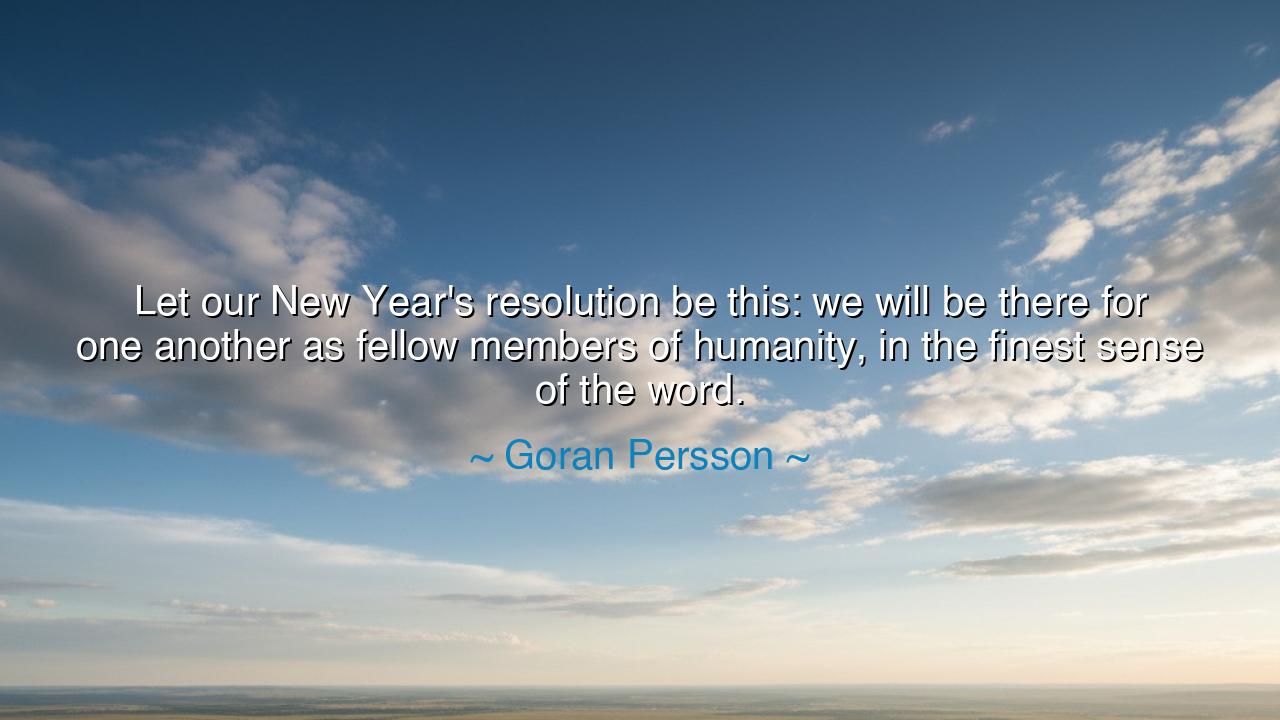
Let our New Year's resolution be this: we will be there for one
Let our New Year's resolution be this: we will be there for one another as fellow members of humanity, in the finest sense of the word.






Hear now the solemn and noble words of Goran Persson, who declared: “Let our New Year’s resolution be this: we will be there for one another as fellow members of humanity, in the finest sense of the word.” This is not a simple greeting for the turning of the year, nor a fleeting vow to break as days grow older. It is a call to arms, a proclamation that the true duty of man and woman is not self alone, but service, care, and unity with one another. For what is humanity, if not the bond that binds us all beyond nation, beyond race, beyond creed?
The meaning of this saying is clear: that resolutions often concern the self—health, fortune, ambition—but Persson dares to lift the eyes of the people higher. He tells us to resolve not merely to improve ourselves, but to strengthen the threads that weave us together. In his vision, the resolution is not about the narrowing of self, but about the widening of the heart. To “be there for one another” is to recognize that our lives are intertwined, that my well-being depends on yours, and yours on mine.
The origin of these words lies in the trials of Persson’s time as a leader. As Prime Minister of Sweden, he faced questions of welfare, equality, and global responsibility. His statement reflects the ancient teaching that societies endure not because of wealth or might, but because of solidarity. Empires fall when selfishness corrodes them; communities thrive when compassion strengthens them. Thus his call echoes across the ages: let us resolve to be, above all, human in the highest sense.
History provides us with examples of this truth. Recall the airlifts of the Berlin blockade in 1948, when the people of West Berlin faced starvation and isolation. In that hour of peril, nations came together, sending food, coal, and supplies by plane in an unbroken chain of mercy. Soldiers and pilots, strangers to those they served, risked their lives daily—not for reward, but because of shared humanity. This act of being “there for one another” shines as a living testament to the words Persson would later speak.
The quote also teaches us that humanity must not be a word cheapened by usage, but reclaimed in its “finest sense.” To be human is not only to think or to speak, but to care, to sacrifice, and to lift up the weak. When we act only for ourselves, we fall to the level of beasts; when we extend ourselves for another, we rise to the noble heights of the spirit. In this, Persson joins the chorus of sages and prophets who have long declared that love of neighbor is the foundation of civilization.
The lesson, then, is not abstract but urgent. As each year turns, let us measure our resolutions not only in pounds lost or wealth gained, but in kindness given, mercy shown, and lives lifted. To “be there” for another may be as simple as a listening ear, as great as standing against injustice, as humble as sharing bread, as heroic as saving lives. The path is wide, but the heart that chooses it walks always toward the finest meaning of being human.
Therefore, let us act. Let this year’s vow not fade into the dust of forgotten promises. Let each one resolve, as Persson urged, to live not for the self alone, but as a guardian of others, as a builder of bridges, as a bearer of light in darkened times. For only then can we say that we have honored the name of humanity—only then can we claim to have lived, in truth, as humans in the finest sense of the word.






AAdministratorAdministrator
Welcome, honored guests. Please leave a comment, we will respond soon